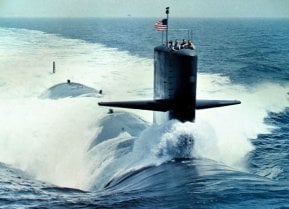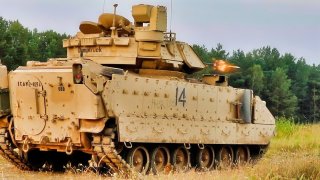Ukraine's Bradley Fighting Vehicle 'Dilemma' Can Be Explained in 2 Words
The U.S. has supplied Ukraine with over 300 Bradley Fighting Vehicles, contributing significantly to Ukraine’s defense efforts. Critics argue that Western weapons should have been supplied in larger numbers to maximize impact and reduce tactical setbacks.
No Gamechanger: The U.S. has supplied Ukraine with over 300 Bradley Fighting Vehicles, contributing significantly to Ukraine’s defense efforts. Critics argue that Western weapons should have been supplied in larger numbers to maximize impact and reduce tactical setbacks.

-Some experts contend that Ukraine’s ability to strategize has been hampered by the incremental nature of Western aid. However, despite billions of dollars in assistance, the frontline situation remains largely static. Continuing to rely on foreign support without a clear path to victory raises questions about long-term sustainability.
-Advocating for peace, rather than more arms, could offer a more feasible path forward.
U.S. Bradleys Boost Ukraine’s Defense: Is More Western Aid Needed?
The U.S. has gifted Ukraine more than 300 Bradley Fighting Vehicles. The Cold War-era Bradley, supplied to Ukraine in far greater numbers than tanks like the Abrams, has bolstered Ukraine’s defense and gained something of a legendary status among Ukrainian fighters.
Now, critics of the slow, incremental way the U.S. has supplied military aid to Ukraine point to the success of the Bradley as an example of what can be accomplished when Western weapons are gifted in greater quantity.
“The way Ukraine’s Western partners have supplied weapons, often in small numbers and after significant delays, has come with heavy criticism throughout the war,” Sinead Baker wrote for Business Insider. “Having enough of a weapon is important for militaries as it allows them to use those weapons more flexibly. It means being able to put the weapons in risky situations where they could achieve big breakthroughs, and if any are lost, it’s not a major tactical and public-relations disaster.”
Said more plainly, what Baker means is that if Ukraine had more Western weapons it wouldn’t be such a big deal when those systems, and the soldiers operating those systems, were destroyed; the military could absorb the loss more readily, and the public would be less likely to care. What Baker glosses over is the many billions-worth of weapons, aid, and cash already gifted to Ukraine, and the many thousands of soldiers already destroyed in a conflict that has long since calcified along fixed lines. Basically, what Baker is saying, nearly three years into the conflict is: give us just a little more and we’ve got this thing. More money. More weapons. More carnage.

The piece refuted the American wisdom for gifting smaller quantities of technical pieces of equipment, advocating instead for larger quantities of simpler, weaker pieces of equipment, citing the Bradley as an example. The Ukrainian Bradleys have been used to fight against Russian infantry, bunkers, troop carriers, drones, and tanks. Given the size of the Ukrainian Bradley fleet, the tank has been used liberally – and successfully.
Bradley cites “experts” for criticizing “the way many of Ukraine’s partners give it aid.” Specifically, the way that “weapons often arrive after months of debate (during which Russia can prepare), in small numbers, and in packages that don’t give Ukraine a clear picture or certainty on future deliveries.” The result is that “Ukraine’s soldiers often can’t develop long-term strategies.”
Well, my two cents would be that if you’re not in a position to supply your own means of defense, and you are not properly equipped to defend yourself, or able to develop long-term strategies, despite receiving billions and billions of dollars-worth of aid, then you may want to aggressively pursue peace.
The idea that Ukraine is one weapons delivery away from punching through, gaining back some territory, or enhancing their position to better sue for peace, seems like wishful thinking. Nothing about the last two and a half years of fighting suggests that Ukraine is going to substantially improve their position. Instead of advocating for more weapons, the spending of more riches and the spilling of more blood, Ukraine should advocate for an end to the conflict.
About the Author: Harrison Kass, Defense Expert
Harrison Kass is a defense and national security writer with over 1,000 total pieces on issues involving global affairs. An attorney, pilot, guitarist, and minor pro hockey player, Harrison joined the US Air Force as a Pilot Trainee but was medically discharged. Harrison holds a BA from Lake Forest College, a JD from the University of Oregon, and an MA from New York University. Harrison listens to Dokken.
Image Credit: Creative Commons and/or Shutterstock.


